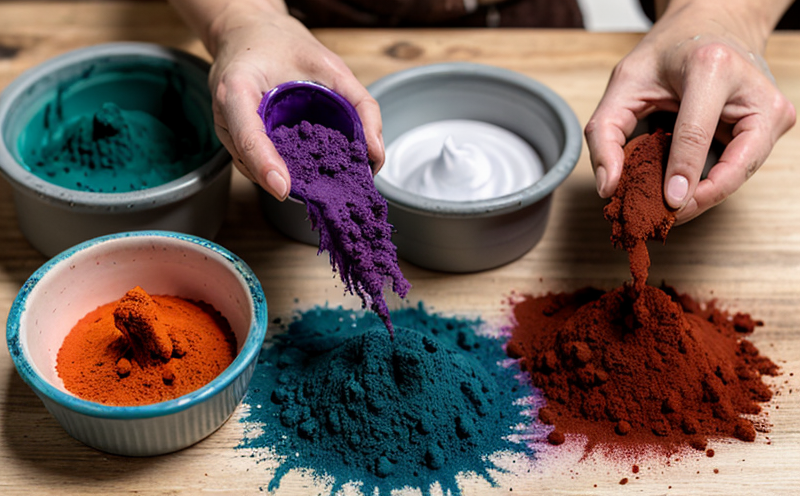Tile Pigment Testing
The testing of tile pigments is a critical component in ensuring product quality and compliance with industry standards. This service involves the analysis of various properties related to pigments used in ceramic, porcelain, and other types of tiles. The goal is to ensure that pigments meet specific performance criteria that guarantee durability, colorfastness, and overall aesthetic appeal.
Tile pigment testing typically includes a range of analyses designed to evaluate the physical, chemical, and mechanical properties of the pigments used in manufacturing. These tests are essential for quality assurance and can help identify potential issues early in the production process. The testing procedures follow established standards such as ASTM C672, ISO 13009, and EN 1485.
Physical characteristics tested include particle size distribution, density, and refractive index. Chemical analysis focuses on elements like iron content, titanium dioxide levels, and other trace metals that can influence the final product's performance. Mechanical properties such as hardness and abrasion resistance are also important in determining how well a tile will withstand daily use.
During specimen preparation, samples of the pigments are taken from production batches or finished tiles and processed according to the test methods specified by relevant standards. This may involve grinding, sieving, and mixing with binders for hardness testing or dispersing into solvents for color measurement.
| Test Parameter | Description | Standard |
|---|---|---|
| Particle Size Distribution | Determined using laser diffraction technology. Ensures uniformity in pigment application. | ASTM C672-18 |
| Density | Measures the mass per unit volume of the pigment, affecting color intensity and durability. | ISO 13009:2004 |
| Refractive Index | Indicates how light bends when it passes through the pigment, influencing visual appearance. | EN 1485-2:2017 |
- Colorfastness: Measures resistance to fading under exposure to sunlight or other conditions.
- Abrasion Resistance: Evaluates the pigment's ability to withstand wear and tear during use.
- Tensile Strength: Assesses the strength of the bond between the pigment and tile matrix.
The results from these tests are crucial for manufacturers as they provide insights into potential issues with pigment quality. For instance, improper particle size distribution could lead to uneven coating or poor adhesion, while high iron content might cause unwanted color variations over time.
Our comprehensive testing services ensure that tiles meet not only internal specifications but also adhere to international standards, providing peace of mind for both manufacturers and consumers alike. By partnering with us, you can rest assured that your tile products are backed by rigorous quality checks designed to enhance customer satisfaction and brand reputation.
Benefits
By leveraging our Tile Pigment Testing service, businesses stand to gain numerous advantages. Firstly, it allows for early detection of defects or inconsistencies in the manufacturing process, enabling timely corrections before they become costly issues downstream.
Secondly, adherence to international standards enhances brand reputation and market credibility, making your products more attractive to discerning buyers who prioritize quality. Additionally, regular testing ensures consistent product performance across different batches, which is vital for maintaining customer trust.
Furthermore, our service helps streamline compliance efforts by ensuring that all necessary tests are conducted according to recognized guidelines. This reduces the risk of non-conformance penalties and potential disruptions in supply chains. Lastly, accurate pigment analysis can lead to cost savings through optimized raw material usage and improved efficiency during production processes.
Customer Impact and Satisfaction
Our Tile Pigment Testing service directly contributes to enhancing customer satisfaction by delivering high-quality products that meet stringent industry standards. When customers receive tiles with consistent color, excellent durability, and superior performance, they are more likely to be satisfied with their purchase.
Moreover, by demonstrating a commitment to quality through rigorous testing, companies can build stronger relationships with their clients and stakeholders. This not only fosters loyalty but also opens doors for future business opportunities based on trust and reliability.
Achieving compliance with international standards such as ASTM C672, ISO 13009, and EN 1485 further underscores our dedication to excellence, ensuring that every aspect of the product lifecycle is optimized. This focus on quality translates into enhanced customer satisfaction, ultimately driving long-term success for both manufacturers and end-users.
Use Cases and Application Examples
| Use Case | Description |
|---|---|
| Color Consistency | Evaluating the consistency of color across different batches to ensure uniform appearance. |
| Durability Testing | Assessing how well pigments withstand environmental factors like humidity and temperature changes. |
| Aesthetic Appeal | Checking the visual quality of tiles to meet design expectations. |
Custom Formulations: Tailored solutions for creating unique pigment blends that match specific client requirements.
Supplier Audits: Assessing the reliability and consistency of pigments supplied by third parties.
New Product Development: Ensuring new formulations meet required standards before launch.
In addition to these specific applications, tile pigment testing plays a vital role in quality control processes throughout the manufacturing lifecycle. From raw material selection to final product inspection, our service provides critical data that guides decision-making at every stage.





